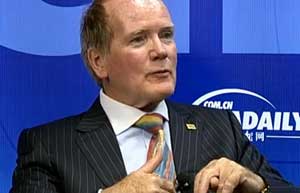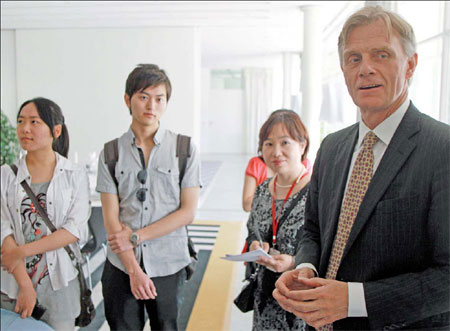UN bid gives Abbas stronger hand
Updated: 2011-09-28 08:08
(China Daily)
|
|||||||||
GAZA CITY - President Mahmoud Abbas' surge of popularity following his bid for UN recognition for a Palestinian state is bound to give him a stronger hand against the rival Hamas group as they prepare to resume talks on a stalled power-sharing deal next week.
The Islamic militant rulers of Gaza have dismissed Abbas' recognition quest as futile. Still, they appear unnerved by his new image as a tough leader standing up to the US, suppressing shows of support for him. In one Gaza City cafe, Hamas security agents switched off a TV showing Abbas' speech to the UN General Assembly and detained the owner.
Despite such tensions, the recent developments may mean future common ground.
Throughout the Palestinian areas, Abbas' decision to seek UN recognition of a state in the West Bank, Gaza and east Jerusalem is being heralded as a major policy shift. For the first time, he is openly bypassing negotiations with Israel, defying the Barack Obama administration on a fundamental issue. This could also make it easier for Abbas and Hamas to find ways to work together and repair their rift.
The Islamists have long opposed negotiations, refusing to recognize Israel or renounce violence. Abbas, ardent in his rejection of violence, has preferred to establish a state through agreement. But he and his aides say privately they see no possibility of striking such a deal with Israel's traditionally hard-line Prime Minister, Benjamin Netanyahu.
On his weekend flight home from New York, Abbas hinted at the possibility of sounding out Hamas about a shared political vision, something he has not raised before.
"There will be deep talks with Hamas, not just about reconciliation, but also about the general horizon" of the Palestinians' future, he said.
For the past four years, the political rift and animosity between the two sides has run deep.
Hamas, shunned by much of the world, overran Gaza in 2007 after defeating Abbas loyalists in fighting and set up a rival government to his internationally backed Palestinian Authority in the West Bank. Each side went after the other's supporters.
Repeated reconciliation attempts failed, in part because of opposition from the US and Egypt, which had acted as a mediator but also wanted to rein in the Islamic militants on its doorstep.
The talks are set to resume next week in Cairo, said Azzam al-Ahmed, the top Fatah negotiator. He confirmed that his mandate is broader than before.
"We don't only want to discuss the terms of reconciliation," he said. "We want to include the Palestinian future ... and this is by recommendation from the president."
But the bitter rivalry between the two sides is never far from the surface.
In the days before Abbas' UN speech, Hamas banned all public shows of support for the Palestinian president. Hamas alleged the edict had the support of Fatah, ostensibly to avoid friction, although some Fatah leaders in Gaza denied they had agreed to stay off the streets.
Associated Press
(China Daily 09/28/2011 page11)










